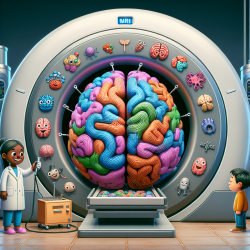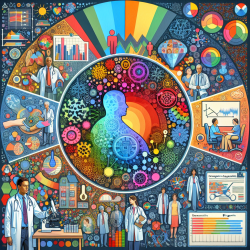Introduction
In the complex world of medical diagnosis, cognitive science offers a powerful lens through which practitioners can refine their clinical decision-making processes. The research article "The Challenge of Cognitive Science for Medical Diagnosis" highlights the intricate interplay between cognitive processes and medical practice. By understanding and implementing the insights from cognitive science, practitioners can enhance their diagnostic accuracy and improve patient outcomes.
Understanding Cognitive Biases in Medical Diagnosis
One of the critical insights from cognitive science is the role of cognitive biases in decision-making. Cognitive biases are systematic patterns of deviation from norm or rationality in judgment, which can lead to diagnostic errors. The article emphasizes the importance of recognizing these biases, such as anchoring and adjustment, and premature closure, which are prevalent in clinical settings.
For example, anchoring bias occurs when a clinician relies too heavily on the initial piece of information (the "anchor") and fails to adjust their judgment adequately. Premature closure happens when a clinician stops considering other possible diagnoses once a diagnosis is made. These biases can significantly impact the accuracy of medical diagnoses.
Implementing Cognitive Science in Clinical Practice
To mitigate the effects of cognitive biases, the article suggests incorporating cognitive science principles into medical education and practice. Here are some practical steps practitioners can take:
- Education and Training: Incorporate cognitive science into medical curricula to raise awareness about cognitive biases and their impact on clinical decision-making.
- Cognitive Bias Mitigation (CBM): Develop strategies to identify and counteract cognitive biases. This can include reflective practice, cognitive debiasing techniques, and fostering a culture of critical thinking.
- Use of Decision Support Tools: Implement decision support systems that provide evidence-based recommendations, helping clinicians make more informed decisions.
- Encourage Reflective Practice: Create opportunities for clinicians to reflect on their decision-making processes and learn from past experiences.
The Future of Cognitive Science in Medicine
The integration of cognitive science into medical practice is not without challenges. The article notes the historical reluctance of the medical field to fully embrace cognitive science due to its perceived complexity and the lack of immediate clinical relevance. However, as the evidence for the role of cognitive biases in diagnostic errors grows, the need for cognitive science in medical education becomes more pressing.
By fostering a deeper understanding of cognitive processes and biases, medical practitioners can enhance their diagnostic accuracy, ultimately leading to better patient outcomes. The article calls for a deliberate effort to include cognitive science in medical training and practice, paving the way for a more rational and evidence-based approach to clinical decision-making.
Conclusion
As we continue to advance in the field of medicine, embracing cognitive science can significantly improve clinical decision-making and reduce diagnostic errors. By understanding and mitigating cognitive biases, practitioners can enhance their diagnostic accuracy and contribute to better patient outcomes. For those interested in exploring this topic further, I encourage you to read the original research paper, The challenge of cognitive science for medical diagnosis.










